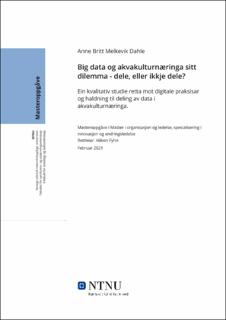| dc.contributor.advisor | Håkon Fyhn | |
| dc.contributor.author | Anne Britt Melkevik Dahle | |
| dc.date.accessioned | 2021-09-28T17:27:25Z | |
| dc.date.available | 2021-09-28T17:27:25Z | |
| dc.date.issued | 2021 | |
| dc.identifier | no.ntnu:inspera:72145750:21890878 | |
| dc.identifier.uri | https://hdl.handle.net/11250/2784380 | |
| dc.description.abstract | Akvakultur er ei næring som har ein kort, men likevel svært omfattande og kompleks historie. På berre om lag 50 år frå den spede starten i 1970-åra er den no ein av dei største næringane i Norge, og den norske næringa er også verdsleiande innan produksjon av altantisk laks.
Næringa er kjent for å vera innovativ. Dei mange pågåande digitale satsingane gjev inntrykk av å befesta posisjonen som ei innovativ næring, men satsingane er ofte enkeltståande, slik at det komplette biletet blir ei fragmentert digital satsing.
Føremålet med denne masteroppgava har vore å etablera innsikt i, og forståing for korleis, og på kva måte vilje/manglande vilje til deling av data kan vera ein faktor som hindrar digitalisering i næringa, og kva som kan vera årsaker til dette.
Med dette som bakteppe vart følgjande problemstilling formulert:
Kva forhold vil ha betydning for å lykkast med ein meir einsarta og samanfallande digitaliseringsstruktur innan akvakultur?
For å svare på problemstillinga vart det gjennomført ein kvalitativ studie, der det er samla inn data frå 5 semistrukturerte intervju med erfarne ressurspersonar i bransjen. Det vart gjort ei avgrensing der ein fokuserte på digitalisering innan sjølanlegg.
Studien har vist at ein ønskjer meir digitalisering og det er vilje til deling av data, men ein deler ikkje meir enn ein må fordi ein fryktar negative konsekvensar. Meir digitalisering vil gje meir transparens, og dette vert opplevd som eit dilemma.
Reservasjon mot å dele finn eg kan ha bakgrunn i tillit, og då særleg i forhold til offentlege mynde. Difor kan manglande tillit til offentlege mynde kan vera ei av årsakene til at digitaliseringa ikkje er komen lenger. Artikkelen «Fish farmers and regulators coping with the wickedness of aquaculture” (Osmundsen et al., 2017) har vore støttande teori.
Fordi endringstakten er høg og kompleksiteten stor kan det vera utfordrande å til ei kvar tid ha tilstrekkeleg trygg informasjon og nok kunnskap til å ha god styring og regulering i næringa. Og fordi det heile tida kjem ny kunnskap og ny teknologi vil den løpande reguleringa heile tida vera i endring. Dette er viktig og nødvendig, men skapar ein uforutsigbarhet for oppdrettarane når det gjeld endringar som kan påverke grenseverdiar, og konsekvensar som følge av dette.
Også Knoster sin Managing Complex Change-modell har vore nyttig teoretisk støtte. Modellen viser korleis fråvær av ulike faktorar gjev resultat som hemmar endringsprosessar, og eg har avslutningsvis implementert faktoren transparens i modellen, og vist korleis fråvær av transparens i endringsprosessar kan påverke tillit. | |
| dc.description.abstract | Aquaculture is an industry with a short, but yet very extensive and complex history. In just about 50 years from its humble beginnings in the 1970’s, it is now one of the largest industries in Norway, and the Norwegian industry is also a world leader in the production of Altantic salmon.
The industry is known for being innovative. The many ongoing digital initiatives give the impression of consolidating the position as an innovative industry, but the initiatives are often detached, so that the complete picture shows fragmented digital efforts.
The purpose of this master’s thesis is to establish insight into, and understanding of, how and in what way the willingness/lack of will to share data can be a factor that hinders digitalization in the industry, and what can be the reasons for this.
With this as a back cloth, the following problem was formulated:
What factors will be important for the success of a more uniform and congruent digitalization structure within aquacultre?
To approach to answer the problem, a qualitative study was conducted, where data were collected from 5 semi-structured interviews with experienced persons in the industry. A delimitiation were made towards focusing on digitalizations within marine facilities.
The study has identified that more digitalization is wanted and there is a willingsness to share data, but one does not share more than ordered due to fear of negative consequences. More digitalization will provide more transparency, and this is perceived as a dilemma.
Reservation against sharing I find may have a background in trust, and then especially in relation to public authorities. Therefore, lack of trust in public authorities may be one of the reasons why digitalization has not come any further. The article “Fish farmers and regulators coping with the wickedness of aquculture” (Osmundsen et al., 2017) has been a supportive theory.
Because the rate of change is high and the complex, it can be challenging to have the sufficient reliable information and enough knowledge to have good governing and regulation in the industry. Because new knowledge and new technology are constantly emerging, regulations will be constantly changing. This is important and necessary, but creates an unpredictability for farmers when it comes to changes than can affect limit values, and next, consequences due to this.
The Knoster Managing Complex Change-model has been a supportive theorethical model as well. The model shows how absence of various factors gives results that inhibit change processes, and I have as a result of my research implemented the factor transparency into the model, showing how absence of transparency in change processes can effect trust. | |
| dc.language | nno | |
| dc.publisher | NTNU | |
| dc.title | Big data og akvakulturnæringa sitt dilemma - dele, eller ikkje dele? | |
| dc.type | Master thesis | |
